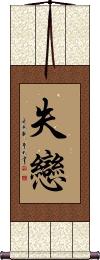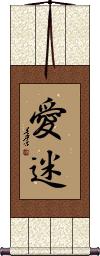Many custom options...
And formats...

Broken Hearted in Chinese / Japanese...
Buy a Broken Hearted calligraphy wall scroll here!
Personalize your custom “Broken Hearted” project by clicking the button next to your favorite “Broken Hearted” title below...
Broken Hearted
In Chinese, this can mean losing one's love; to breaking up (in a romantic relationship); to feel jilted.
In Japanese Kanji, this means disappointing love, broken heart, unrequited love, or being lovelorn.
失戀 is also valid in old Korean Hanja, which means unrequited love, unreturned love, a disappointment in love, or a broken heart.
Note: In modern Japan, they will tend to write the more simple 失恋 form instead of 失戀. If you order this from the Japanese master calligrapher, expect the more simple modern version to be written (unless you give us instructions to use the older or more traditional version).
Lost Love
The Pain of Love / Love Troubles
Not the results for broken hearted that you were looking for?
Below are some entries from our dictionary that may match your broken hearted search...
| Characters If shown, 2nd row is Simp. Chinese |
Pronunciation Romanization |
Simple Dictionary Definition |
傷心 伤心 see styles |
shāng xīn shang1 xin1 shang hsin shoushin / shoshin しょうしん |
to grieve; to be broken-hearted; to feel deeply hurt (n,adj-no,vs,vi) heartbreak; grief; sorrow |
心傷 心伤 see styles |
xīn shāng xin1 shang1 hsin shang |
broken-hearted |
依依不捨 依依不舍 see styles |
yī yī bù shě yi1 yi1 bu4 she3 i i pu she |
reluctant to part (idiom); broken-hearted at having to leave |
傷心蒿目 伤心蒿目 see styles |
shāng xīn hāo mù shang1 xin1 hao1 mu4 shang hsin hao mu |
to grieve; broken-hearted |
柔腸寸斷 柔肠寸断 see styles |
róu cháng cùn duàn rou2 chang2 cun4 duan4 jou ch`ang ts`un tuan jou chang tsun tuan |
lit. to feel as if one's intestines have been cut short; broken-hearted (idiom) |
涕泗滂沱 see styles |
tì sì pāng tuó ti4 si4 pang1 tuo2 t`i ssu p`ang t`o ti ssu pang to |
a flood of tears and mucus; broken-hearted and weeping bitterly |
The following table may be helpful for those studying Chinese or Japanese...
| Title | Characters | Romaji (Romanized Japanese) | Various forms of Romanized Chinese | |
| Broken Hearted | 失戀 失恋 | shitsuren | shī liàn / shi1 lian4 / shi lian / shilian | shih lien / shihlien |
| Lost Love | 愛迷 | ai mei / aimei | ||
| The Pain of Love Love Troubles | 戀の悩み 恋の悩み | koinonayami | ||
| In some entries above you will see that characters have different versions above and below a line. In these cases, the characters above the line are Traditional Chinese, while the ones below are Simplified Chinese. | ||||
Successful Chinese Character and Japanese Kanji calligraphy searches within the last few hours...






